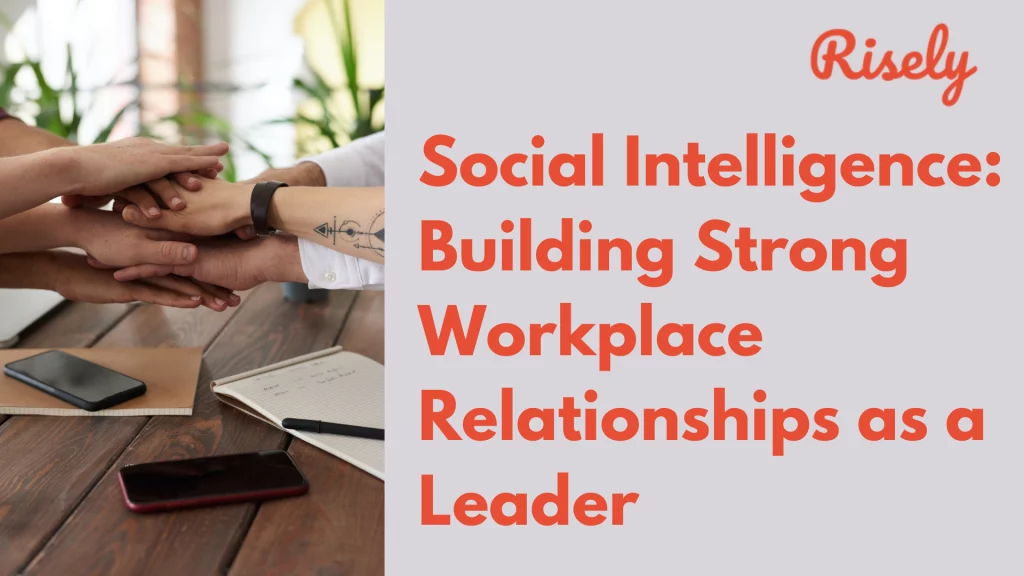Social Intelligence: Building Strong Workplace Relationships as a Leader
The importance of solid workplace relationships cannot be overstated. And as a leader, it is your responsibility to foster an environment that encourages healthy communication and collaboration. One way to achieve this is through social intelligence—the ability to understand and navigate social situations effectively. In this blog post, we will delve into the characteristics that define socially intelligent leaders, the benefits of cultivating social intelligence in the workplace, and how you can develop your social intelligence skills as a manager or team leader. By prioritizing social intelligence in the workplace, you can build stronger relationships with your team members, improve collaboration and performance, and create a more positive work environment for everyone involved.- Social Intelligence: Building Strong Workplace Relationships as a Leader
- What is Social Intelligence, and Why it Matters in the Workplace?
- Understanding the Characteristics of Socially Intelligent Leaders
- The Link Between Social Intelligence and Effective Leadership
- Developing Social Intelligence in the Workplace
- Improving Social Intelligence as a Leader or Manager
- Conclusion
- Other Related Blogs
What is Social Intelligence, and Why it Matters in the Workplace?
Effective workplace relationships are essential to success in any organization. However, building and maintaining such relationships requires social intelligence that only some possess. Social intelligence is navigating complex social situations and understanding others’ needs and perspectives effectively. Social intelligence refers to the ability to understand and navigate social situations effectively. It involves being aware of one’s own emotions and those of others and being able to communicate effectively, empathize with others, and build positive relationships. Social intelligence is critical to personal and professional success, enabling individuals to interact effectively with others and make strong connections. In the workplace, leaders with high social intelligence can build strong relationships with their team members, leading to better communication, collaboration, and conflict resolution. Moreover, developing social intelligence can enhance leadership skills and lead to greater workplace success by fostering employee engagement, productivity, and job satisfaction. Also check out: 5 Secrets To Create A Winning Employee Engagement StrategyUnderstanding the Characteristics of Socially Intelligent Leaders
Empathy and Understanding Team Members
Effective leaders with high social intelligence possess empathy and understanding toward team members. They can put themselves in their team’s shoes and see things from their perspective, which helps them build meaningful relationships. In addition, socially intelligent leaders actively listen to their team members and show a genuine interest in their concerns and needs. By being empathetic and understanding, leaders can create a positive work culture that promotes collaboration, innovation, and productivity. These qualities also foster trust and loyalty among team members, leading to better communication and stronger relationships overall.Clear Communication Skills
Effective communication is crucial for leaders with high social intelligence. They understand that clear communication helps foster a positive work environment and builds trust among team members. Socially intelligent leaders can adapt their communication styles to fit the needs of different individuals or groups. Active listening and providing feedback are also essential components of effective communication, both of which are integral to the concept of social intelligence. By being skilled communicators, socially intelligent leaders can inspire and motivate their teams, increasing productivity and success.Positive Attitude and Outlook
Maintaining a positive attitude and outlook is one of the primary characteristics of socially intelligent leaders. These leaders have a growth mindset and view challenges as opportunities for improvement and development. A positive outlook helps them build strong relationships with their team members, which ultimately translates into enhanced collaboration and improved performance. It also creates a supportive work environment that fosters employee engagement and motivation. A socially intelligent leader’s positive attitude also enables them to handle difficult situations gracefully, reducing the risk of escalating conflicts and creating an atmosphere of mutual trust and respect. In short, developing a positive mindset is essential to building social intelligence as a leader or manager.Other Interesting Reads
The Link Between Social Intelligence and Effective Leadership
Effective leadership requires more than just technical skills; it also demands high social intelligence. Leaders with social intelligence are better equipped to understand and communicate with their team members, manage conflict tactfully, and create a positive work environment. In addition, leaders with solid social intelligence tend to be skilled at building collaborative relationships with their teams, which can lead to increased employee engagement and satisfaction. Therefore, developing social intelligence is essential for leaders who want to improve their effectiveness and drive business success.Improved Team Collaboration and Performance
Effective collaboration and teamwork are crucial for achieving organizational success. Leaders with social intelligence can foster a collaborative work environment by building strong relationships with their team members. When team members feel connected and valued, they are more likely to work together effectively towards shared goals. Improved team collaboration enhances productivity, increased creativity, and better decision-making. In addition, socially intelligent leaders prioritize open communication, active listening, and empathy to create a supportive work culture where everyone feels heard and respected. By cultivating social intelligence as a leader, you can elevate your team’s performance and drive business success.Better Conflict Resolution
Effective conflict resolution is crucial to any successful workplace, and socially intelligent leaders are better equipped to navigate these situations. By identifying the root causes of conflicts and communicating effectively with team members, socially competent leaders can resolve conflicts in a way that is satisfactory for all parties involved. In addition, it creates a more positive work environment where employees feel heard and valued, improving productivity. Social intelligence requires self-awareness, active listening skills, empathy, and emotional regulation. By prioritizing these skills, leaders can effectively manage conflicts and create a harmonious work environment.Increased Employee Engagement and Satisfaction
A workplace where employees feel valued and supported by their leaders increases job satisfaction and engagement. Socially intelligent leaders know how to build strong relationships with their team members, providing them with the support they need to succeed. By showing empathy, understanding, and effective communication skills, leaders can create a positive work environment that encourages employees to be productive and committed to their work. Read more here: 8 Tips To Create A Positive Workplace Environment That Your Team Loves
Developing Social Intelligence in the Workplace
Active Listening Techniques
Effective active listening is an essential skill that socially intelligent leaders possess. It involves paying full attention to what others say and showing that you understand and care about their perspectives. Leaders who actively listen to their team members can better understand their needs, motivations, and challenges, leading to improved relationships and a more effective team. Furthermore, active listening techniques such as maintaining eye contact, nodding and providing verbal feedback, asking clarifying questions, and summarizing what the other person has said can help build trust, foster better communication, and improve relationships in the workplace. Practicing active listening consistently can improve social intelligence and, ultimately, better leadership skills. Learn more here: Active vs Passive listening: What’s the difference and why does it matter?Cultural Awareness and Sensitivity
In today’s global work environment, cultural awareness and sensitivity are essential for leaders and managers. By recognizing the diverse cultural backgrounds of their team members, leaders can promote a more inclusive and respectful workplace culture. Cultural awareness involves understanding and respecting different customs, traditions, and beliefs. It also means acknowledging personal biases and avoiding microaggressions that can negatively impact relationships with team members from diverse backgrounds. Leaders prioritizing cultural awareness and sensitivity create an environment where everyone feels valued and respected, leading to better collaboration, higher productivity, and job satisfaction. Here’s a detailed blog to help you further: How a Multicultural Workplace Boosts Your Bottom Line and Work CultureEncouraging Open Communication and Feedback
Fostering open communication and encouraging feedback is essential for building trust and creating a positive work environment. Leaders who create an atmosphere where employees feel comfortable sharing their thoughts and ideas can improve collaboration and boost problem-solving skills. Open communication can increase employee engagement, better team performance, and more cohesive company culture. Encouraging feedback also helps leaders identify areas for improvement and develop solutions that benefit the team.Improving Social Intelligence as a Leader or Manager
Developing social intelligence is crucial for leaders and managers who want to foster positive workplace relationships. A critical component of social intelligence is self-awareness. Leaders who develop self-awareness can better understand their emotions and how they impact their interactions with team members. It leads to improved relationships, better conflict resolution skills, and a more positive work environment overall.Identifying Personal Biases and Blind Spots
To build strong workplace relationships, leaders must first identify and address their personal biases and blind spots. These biases can be based on gender, race, ethnicity, or personal experiences. Failing to address these biases can lead to misunderstandings, conflicts, and a breakdown in communication between team members. By acknowledging and challenging these biases, leaders can improve their social intelligence and create a more inclusive and productive work environment.Seeking Feedback and Self-Reflection
Leaders keen on improving their social intelligence must be open to seeking feedback and self-reflection. By actively soliciting input from others, leaders can gain a unique perspective on how their actions and words impact those around them. Self-reflection is also critical to building social intelligence, as it allows leaders to analyze their behavior and interactions with others. It involves taking the time to think about how one’s actions may have affected others, identify areas for improvement, and work towards addressing them.Investing in Training and Coaching
Investing in training and coaching can be a game-changer for leaders looking to improve their social intelligence skills. Leaders can gain valuable insights into communication styles, cultural backgrounds, and personalities by participating in training sessions. This knowledge can help them better understand their team members’ perspectives, communicate more effectively with their colleagues, and build stronger workplace relationships. Coaching can also provide leaders with personalized feedback on enhancing specific social intelligence skills. For example, through guided practice and support from coaches, leaders can hone active listening techniques, practice empathy, and learn to interpret nonverbal cues accurately. As a result of investing in training and coaching, leaders can create a positive work environment that fosters collaboration, improves decision-making processes, increases productivity, and promotes higher employee retention rates.Conclusion
Social intelligence is crucial for leaders who want to build strong workplace relationships. It involves understanding and empathizing with team members, communicating clearly, and maintaining a positive attitude. Leaders with social intelligence can improve team collaboration, resolve conflicts more effectively, and increase employee engagement and satisfaction. To develop social intelligence in the workplace, try active listening techniques, cultural awareness, and sensitivity, and encourage open communication and feedback. As a leader or manager, it’s important to identify personal biases and seek feedback and self-reflection. Investing in training and coaching can also help improve your social intelligence skills. Remember that building strong workplace relationships is key to success as a leader.Take a free active listening assessment to become a socially intelligent leader.
Active listening helps managers navigate work environments effectively. Assess your skills today to become a pro.
What are the types of social intelligence?
Social intelligence encompasses several types or components, including:
– Social Awareness: The ability to perceive and understand the emotions, needs, and intentions of others.
– Social Perception: The skill to accurately interpret social cues, body language, and non-verbal communication.
– Social Influence: The capacity to persuade, inspire, and positively impact others’ thoughts, attitudes, and behaviors.
– Social Adaptability: The capability to adjust one’s behavior and communication style to fit different social situations and individuals.
– Social Skills: Proficiency in building and maintaining relationships, effective communication, conflict resolution, and collaboration.
– Social Awareness: The ability to perceive and understand the emotions, needs, and intentions of others.
– Social Perception: The skill to accurately interpret social cues, body language, and non-verbal communication.
– Social Influence: The capacity to persuade, inspire, and positively impact others’ thoughts, attitudes, and behaviors.
– Social Adaptability: The capability to adjust one’s behavior and communication style to fit different social situations and individuals.
– Social Skills: Proficiency in building and maintaining relationships, effective communication, conflict resolution, and collaboration.
How do you show social intelligence?
To show social intelligence, one can:
– Actively listen to others and demonstrate empathy.
– Display respect and consideration for others’ perspectives and feelings.
– Adapt communication style to match the needs of different individuals.
– Use non-verbal cues effectively, such as maintaining appropriate eye contact and body posture.
– Navigate social dynamics and conflicts with diplomacy and tact.
– Actively listen to others and demonstrate empathy.
– Display respect and consideration for others’ perspectives and feelings.
– Adapt communication style to match the needs of different individuals.
– Use non-verbal cues effectively, such as maintaining appropriate eye contact and body posture.
– Navigate social dynamics and conflicts with diplomacy and tact.
What are the 5 characteristics of social intelligence?
The five characteristics of social intelligence are:
– Empathy: The ability to understand and share the emotions of others, allowing for better connection and responsiveness.
– Self-Awareness: Being conscious of one’s own emotions, strengths, weaknesses, and impact on others.
– Emotional Regulation: Managing and controlling one’s own emotions in order to respond appropriately in social situations.
– Social Skills: Possessing effective interpersonal skills, including communication, conflict resolution, and relationship-building abilities.
– Social Influence: The capacity to positively influence and inspire others, fostering collaboration and achieving common goals.
– Empathy: The ability to understand and share the emotions of others, allowing for better connection and responsiveness.
– Self-Awareness: Being conscious of one’s own emotions, strengths, weaknesses, and impact on others.
– Emotional Regulation: Managing and controlling one’s own emotions in order to respond appropriately in social situations.
– Social Skills: Possessing effective interpersonal skills, including communication, conflict resolution, and relationship-building abilities.
– Social Influence: The capacity to positively influence and inspire others, fostering collaboration and achieving common goals.
Other Related Blogs
Handling Emotions at Work Effectively | Reiner Lomb
Handling Emotions at Work Effectively | Reiner Lomb Emotions are what make us human. But that’s also the part we try hard to hide in workplaces. Yet, healthy workplaces do…
Ennui: 7 out of 10 people on your team are bored
Ennui: 7 out of 10 people on your team are bored Over the past weekend, Inside Out 2 became the fastest animated film to cross the $1 billion mark. That’s…
Emotional Intelligence In Communication: 5 Ways Smart Leaders Act
Emotional Intelligence In Communication: 5 Elements Smart Leaders Use Effective communication is the cornerstone of a thriving workplace. It doesn’t matter if you’re speaking to your team members, clients, or…
IQ Vs EQ In The Workplace: How To Use Both Together
IQ Vs EQ In The Workplace: How To Use Both Together? When it comes to being an effective manager, what takes the lead – your head or your heart? For…







